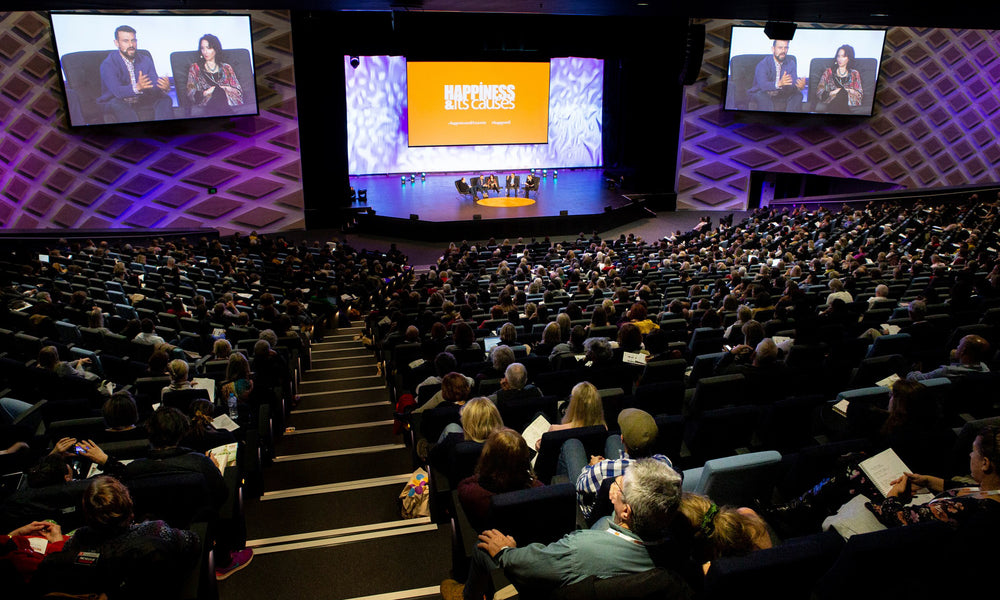
When the conference director of Happiness and Its Causes asked me to host a panel discussion between experts on deepening our mind-body connection so that we can lead healthier lives, I was delighted. It’s a topic I’m dedicated to raising awareness about and the lineup was terrific.
There was Michael Mosely – the famed English doctor and BBC presenter known for self-experimenting in the name of science, Elissa Epel – an American psychiatry professor and stress expert, who co-authored the bestselling book The Telomere Effect about healthy ageing, Amit Bernstein – an Israeli mindfulness professor who is doing extraordinary work with traumatised refugees in the Middle East, and John Maddocks – an Aussie travel photojournalist who experienced unimaginable trauma firsthand when he was swept up in the world’s worst tsunami.
My task was to bring these disparate perspectives together into one engaging panel discussion that would leave the 1300 mental health professionals and wellbeing enthusiasts in the audience with tangible takeaways that they could apply to their work and personal lives.

In hindsight, I should have known that the discussion would take surprising turns.
I had expected that Michael Mosely would reiterate the importance of diet and exercise for good mental and physical health. After all, his recovery from Type 2 diabetes and advocacy for a diet involving meal fasting and time-restricted eating alongside high intensity exercise has earned him the kind of fame that saw him mobbed by fans after the event. Instead, he revealed that he’s recently taken up dancing lessons with his wife, both for the mental challenge of co-ordinating his two left feet and for the shared experience with his wife, who he considers to be the biggest influence on his health.

As a psychologist and researcher, who I met recently in the Middle East while shooting my new documentary about mindfulness, I had expected that Amit Bernstein would talk about the mechanisms underpinning the effects of meditation on traumatised refugees. Instead, he revealed that cutting out FODMAPS (Fermentable Oligosaccharides, Disaccharides, Monosaccharides and Polyols) from his diet had been life changing for him personally and emphasised the many different ways that we can integrate our mind and body for good health, including by eating well, nurturing our relationships, exercising regularly, and finding meaning and purpose.
Likewise, John Maddocks, who has an inspiring tale of resilience after his shocking encounter with a tsunami, could have spoken about the role of meditation in his trauma recovery, but unexpectedly he revealed that as a committed Buddhist he’s concerned that mindfulness has gone the way of reductionist medicine and been taken out of context instead of being included as just one element of an eight-part definition of what it means to be a healthy, whole human being.
Finally, I expected that Elissa Epel, who studies the link between chronic stress and cellular ageing in our body, would emphasise the importance of mental rest and relaxation if we want to lead long and healthy lives. Instead she explained that although stress and health are inextricably linked, the concept of the “mind” as something that exists entirely in our head is a misnomer and that she believes the solution to the chronic health epidemic will rely on understanding how our emotions and experience of the world are constructed from both our internal and external environments.
In the days following the panel discussion I’ve been thinking about the take-home message that brings all these surprising perspectives on the mind-body-health connection together. From the celebrity doctor who advocated the importance of relationships, to the scientist who emphasised the interconnectivity of all-things; despite the fact that the panelists had very singular perspectives in their professional lives, they were in total agreement about taking a whole-person, whole-world, whole-life approach to health and wellbeing.
It’s been five years since I released my documentary The Connection, which explores the science underpinning the mind-body-health connection and in hindsight, the direction of the discussion was actually unsurprising.
Regular readers will know that taking this approach has been instrumental in my ongoing recovery from a chronic illness and that after pouring through thousands of scientific studies and interviewing dozens of health researchers I realised I needed to stop looking for the one thing that was causing my illness and start looking at all the areas in my life that needed attention. Pretty soon what followed was the very essence of health that, as the World Health Organisation so eloquently defines, as “a state of complete physical, mental, and social well-being, and not merely the absence of disease or infirmity.”
* Images courtesy of Happiness and Its Causes





 The Connection (DOWNLOAD-TO-OWN)
The Connection (DOWNLOAD-TO-OWN) My Year Of Living Mindfully - Book
My Year Of Living Mindfully - Book




